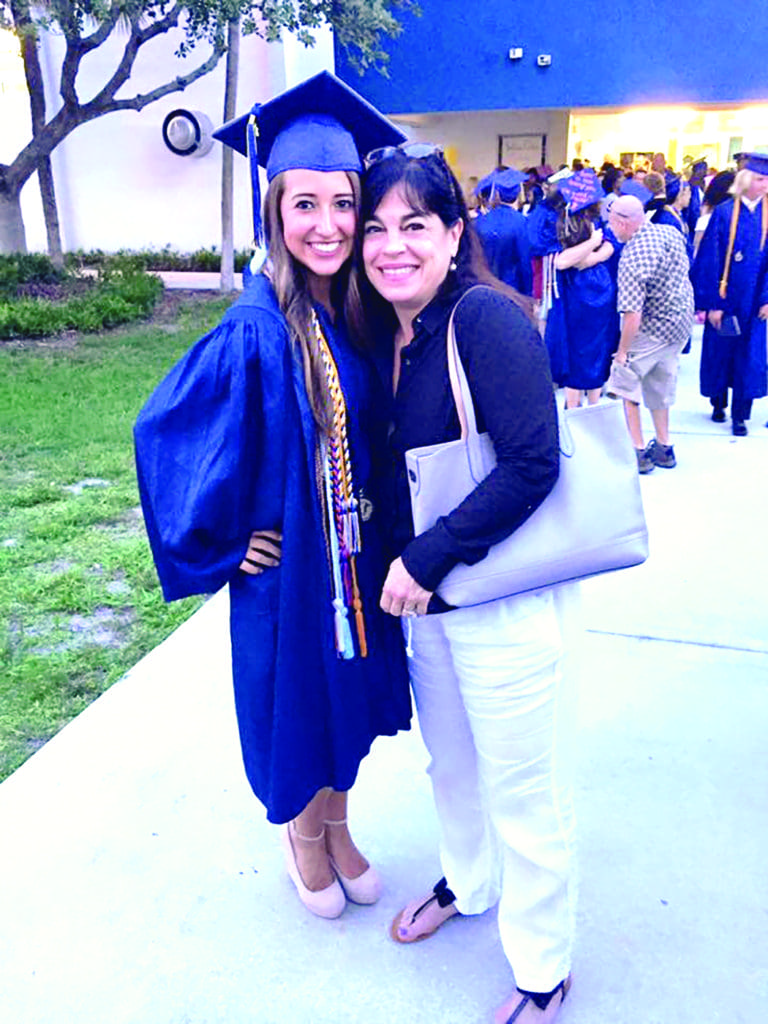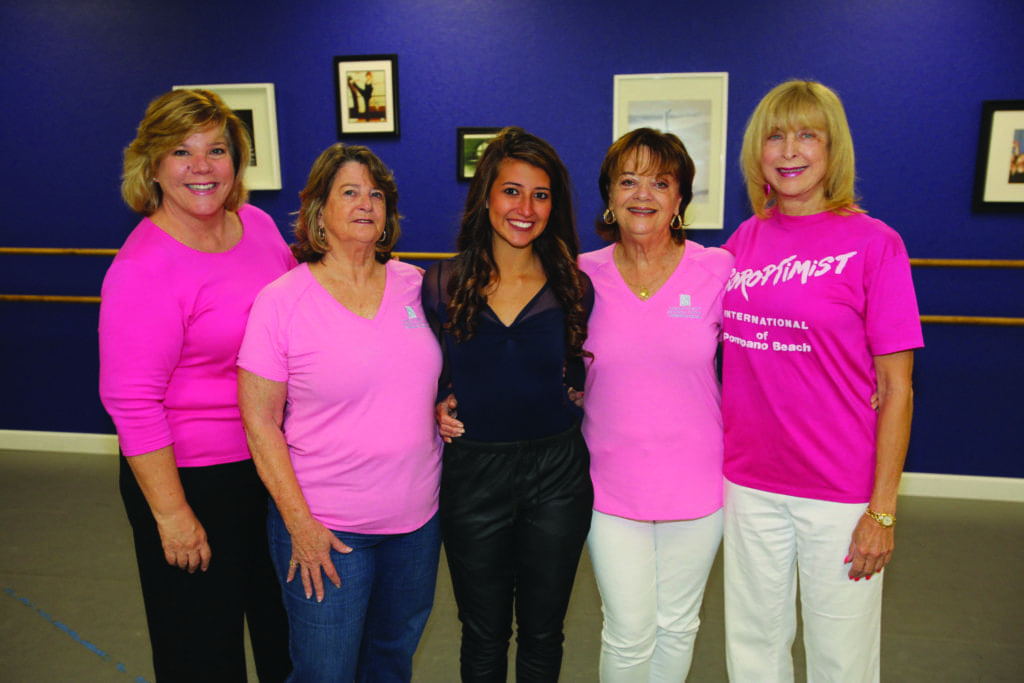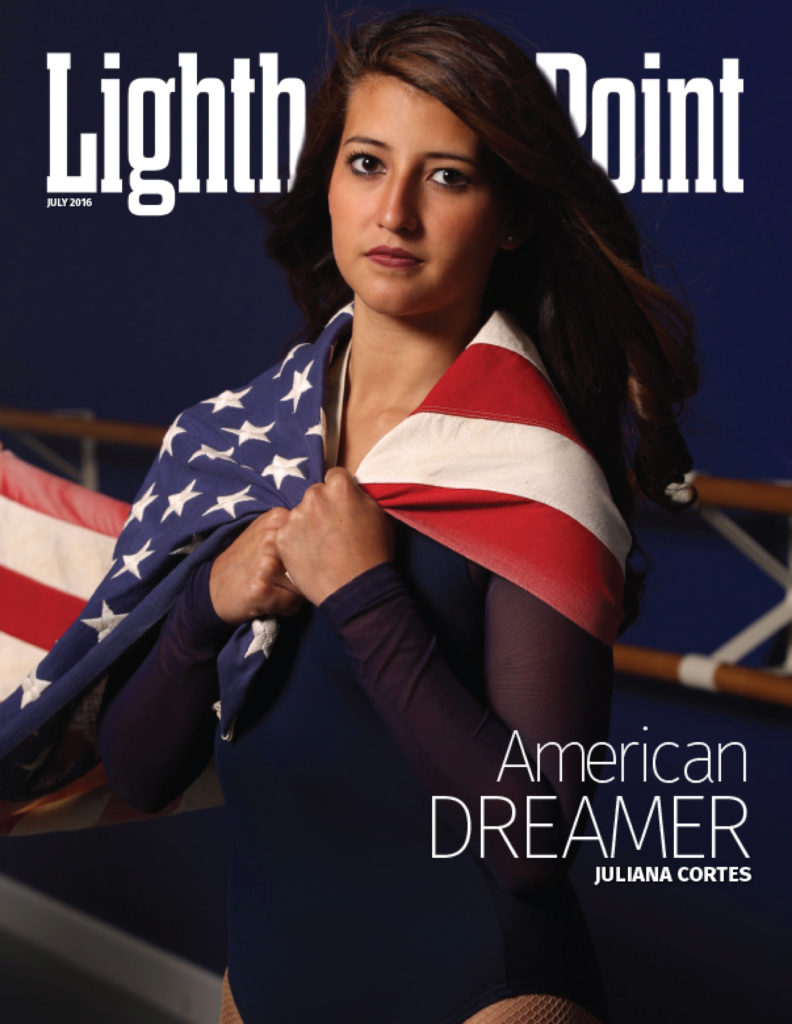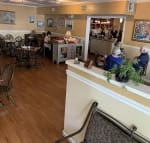American Dreamer
Our Dreamer
Juliana Cortes is a dreamer in two senses of the word: She dreams of graduating from college and becoming a professional dancer;
and she dreams of becoming a United States citizen.
By Danielle Charbonneau
By Danielle Charbonneau
Photo by Andrew Itkoff
Juliana is what is commonly referred to as a “Dreamer”—a young person who immigrated to the U.S. at a young age, grew up in the states and identifies as an American, but is not one, legally speaking. Though Juliana has been a part of the local community since she was 8 years old, was this year’s homecoming queen at Pompano Beach High School, graduated with a 4.4 GPA, has trained in dance for a decade, and was accepted to a prestigious dance program in New York, Juliana’s dreams are on precarious ground.
As a registered student in President Obama’s Deferred Action for Childhood Arrivals (DACA) program, Juliana can temporarily avoid deportation, work legally, have a driver’s license and a social security number, but cannot qualify for any kind of federal student loans or grants. Without these loans and grants, Juliana may not be able to afford college. In addition, Juliana’s DACA status could be in jeopardy as the political tides face a potential shift. Thus, Juliana’s dreams of college, dance and U.S. citizenship could go unrealized.
Even so, Juliana is pressing on. When her dance trainer and mentor, Suzanne Citere, learned of Juliana’s difficulty funding school, she sprung to action planning community fundraisers and promoting a Go Fund Me page online https://www.gofundme.com/JulianaCortes. With the help of the local community, a few scholarships and some fans in the dance world, Juliana has raised over $18,000 for her college fund as of press time. In doing so, however, she’s had to come out publicly with her story. Her journey out of the dark and into the spotlight has been a deeply difficult one. With attention comes both risk and responsibility—not only for Juliana, but for her mother and other dreamers like her.
Juliana’s First Moves
Suzanne, Juliana’s mentor and the owner of Lighthouse Point’s RealDance, remembers the day 8-year-old Juliana Cortes took her first timid step inside the dance studio.
“She had literally just arrived from Columbia with her mom and she barely spoke a word of English,” said Suzanne. “I think she learned a lot of English by being in dance with us. She was super focused. I could always tell whenever I was talking to her. Her eyes were on me at all times and she was listening to everything I said in an attempt, obviously, to learn dance, but also to learn English. And she did. She learned quickly.”
She didn’t start out with a lot of natural talent, Suzanne said.
“She was a child who, upon first meeting her, was just like every other kid. It wasn’t like she walked in and I thought, oh, this kid is born to be a dancer. She’s going to be a star.” Suzanne said. “She wasn’t fantastic, and she wasn’t terrible. She was just hardworking.”
As Juliana grew as a dancer and fell more in love with the art, her single, working mother had to find a way to overcome the financial burden of intensive dance training.
“Training in dance is not cheap,” Suzanne said. “It’s very, very expensive.”
As a housecleaner, Juliana’s mother couldn’t afford the classes, but she didn’t let that stand in the way of helping her daughter pursue her passion. She made an arrangement with Suzanne to clean the studios twice a week, top-to-bottom, on trade for Juliana’s dance lessons. She made Juliana help every Sunday. When other kids were out playing, Juliana helped her mother polish mirrors and mop floors. She learned to invest in her passion.
“I owe everything to her,” Juliana said about her mother.
By age 12, Juliana was working at the studio as an assistant, aiding Suzanne with the baby ballerinas. She helped the little girls pull up their tights, slip on ballet slippers and fluff their tutus. She patiently taught them how to plié and stand in first position. By 13, Juliana was assisting in jazz, hip-hop and acrobatics classes. Eventually she helped coach the junior competition team, stepped in as a substitute teacher and continued helping her mother clean the studio on the weekends. Throughout middle and high school, she earned enough credit to participate in RealDance’s full time training program. RealDance became Juliana’s community, job and home away from home. Dance became her guiding force and life’s passion. When she wasn’t at home, school, or her second job at Body & Soul Spa, Juliana was almost always at the studio.
“It is so gratifying to see what can be accomplished with a child when they are invested. You know that cliché about ‘rather having a hard-worker than someone with natural talent?’ Well Juliana is the embodiment of that concept. It’s through hard work that she achieved the success she enjoys now. She’s been one of the most gratifying kids I’ve taught over the years because she invested
so deeply.”
In the seven years Juliana danced competitively, she participated in over 30 dance competitions. She’s earned a long list of dance accolades including winning the title of Miss Headliner at the 2016 Ft. Lauderdale Headliners Dance Competition. She received two awards for stage presence (one from Dance Educators of America (DEA), the other from Headliners Dance Competition), and an award for musicality. She was the recipient of three different dance scholarships: one to attend a ballet intensive workshop with DEA, and two more to participate in musical theater intensives in Las Vegas.
With such accolades, it was no surprise to Suzanne that Juliana was accepted into Marymount Manhattan’s dance program. What did come as a surprise to Suzanne was Juliana’s inability to obtain any federal financial aid. It wasn’t until Juliana texted Suzanne to tell her about her acceptance into Marymount that Suzanne learned Juliana was ineligible. Juliana herself didn’t know about her ineligibility under DACA until her FAFSA (Free Application for Federal Student Aid) forms were denied during the application process.
“She texted me and said: ‘I got into Marymount. I know I’ll never be able to pay for it, but it was nice to know I could go,” said Suzanne.
Up until that point, Suzanne assumed Juliana could get school loans. She knew a little about Juliana’s status under DACA, but assumed since Juliana had a social security number and was able to work legally that she would be entitled to the same benefits other American workers are. The news came as a shock.
“At first I was really angry with the school counselors for not telling Juliana sooner,” said Suzanne. “Then I found out they don’t even know which students fall under DACA. They can’t. They’re not allowed to.”
To protect a student’s anonymity, DACA prohibits school administrators from knowing, asking or identifying DACA students. It was frustrating to Suzanne who said that, had she known Juliana’s situation, she would have gladly helped Juliana fundraise throughout her four years in high school. By the time Juliana learned of her acceptance to Marymount, it was far too late. Juliana only had two months to respond to the school’s offer of admission. Suzanne felt a sense of responsibility.
Suzanne, Juliana’s mentor and the owner of Lighthouse Point’s RealDance, remembers the day 8-year-old Juliana Cortes took her first timid step inside the dance studio.
“She had literally just arrived from Columbia with her mom and she barely spoke a word of English,” said Suzanne. “I think she learned a lot of English by being in dance with us. She was super focused. I could always tell whenever I was talking to her. Her eyes were on me at all times and she was listening to everything I said in an attempt, obviously, to learn dance, but also to learn English. And she did. She learned quickly.”
She didn’t start out with a lot of natural talent, Suzanne said.
“She was a child who, upon first meeting her, was just like every other kid. It wasn’t like she walked in and I thought, oh, this kid is born to be a dancer. She’s going to be a star.” Suzanne said. “She wasn’t fantastic, and she wasn’t terrible. She was just hardworking.”
As Juliana grew as a dancer and fell more in love with the art, her single, working mother had to find a way to overcome the financial burden of intensive dance training.
“Training in dance is not cheap,” Suzanne said. “It’s very, very expensive.”
As a housecleaner, Juliana’s mother couldn’t afford the classes, but she didn’t let that stand in the way of helping her daughter pursue her passion. She made an arrangement with Suzanne to clean the studios twice a week, top-to-bottom, on trade for Juliana’s dance lessons. She made Juliana help every Sunday. When other kids were out playing, Juliana helped her mother polish mirrors and mop floors. She learned to invest in her passion.
“I owe everything to her,” Juliana said about her mother.
By age 12, Juliana was working at the studio as an assistant, aiding Suzanne with the baby ballerinas. She helped the little girls pull up their tights, slip on ballet slippers and fluff their tutus. She patiently taught them how to plié and stand in first position. By 13, Juliana was assisting in jazz, hip-hop and acrobatics classes. Eventually she helped coach the junior competition team, stepped in as a substitute teacher and continued helping her mother clean the studio on the weekends. Throughout middle and high school, she earned enough credit to participate in RealDance’s full time training program. RealDance became Juliana’s community, job and home away from home. Dance became her guiding force and life’s passion. When she wasn’t at home, school, or her second job at Body & Soul Spa, Juliana was almost always at the studio.
“It is so gratifying to see what can be accomplished with a child when they are invested. You know that cliché about ‘rather having a hard-worker than someone with natural talent?’ Well Juliana is the embodiment of that concept. It’s through hard work that she achieved the success she enjoys now. She’s been one of the most gratifying kids I’ve taught over the years because she invested
so deeply.”
In the seven years Juliana danced competitively, she participated in over 30 dance competitions. She’s earned a long list of dance accolades including winning the title of Miss Headliner at the 2016 Ft. Lauderdale Headliners Dance Competition. She received two awards for stage presence (one from Dance Educators of America (DEA), the other from Headliners Dance Competition), and an award for musicality. She was the recipient of three different dance scholarships: one to attend a ballet intensive workshop with DEA, and two more to participate in musical theater intensives in Las Vegas.
With such accolades, it was no surprise to Suzanne that Juliana was accepted into Marymount Manhattan’s dance program. What did come as a surprise to Suzanne was Juliana’s inability to obtain any federal financial aid. It wasn’t until Juliana texted Suzanne to tell her about her acceptance into Marymount that Suzanne learned Juliana was ineligible. Juliana herself didn’t know about her ineligibility under DACA until her FAFSA (Free Application for Federal Student Aid) forms were denied during the application process.
“She texted me and said: ‘I got into Marymount. I know I’ll never be able to pay for it, but it was nice to know I could go,” said Suzanne.
Up until that point, Suzanne assumed Juliana could get school loans. She knew a little about Juliana’s status under DACA, but assumed since Juliana had a social security number and was able to work legally that she would be entitled to the same benefits other American workers are. The news came as a shock.
“At first I was really angry with the school counselors for not telling Juliana sooner,” said Suzanne. “Then I found out they don’t even know which students fall under DACA. They can’t. They’re not allowed to.”
To protect a student’s anonymity, DACA prohibits school administrators from knowing, asking or identifying DACA students. It was frustrating to Suzanne who said that, had she known Juliana’s situation, she would have gladly helped Juliana fundraise throughout her four years in high school. By the time Juliana learned of her acceptance to Marymount, it was far too late. Juliana only had two months to respond to the school’s offer of admission. Suzanne felt a sense of responsibility.
“We talk to all the kids about how dance can help them and how they can do anything they want,” Suzanne said. “I felt like I dangled this carrot in front of her face all of these years and then, when push came to shove, we were all slapped with this reality, like oh, no you can’t. You did all that [training], but you’re not going to get the same thing out of it that everybody else is just because you weren’t born here.”
Juliana with Suzanne Citere at the Pompano Beach High School graduation ceremony.

A Community Comes Together
Suzanne couldn’t sit back and do nothing. She sprung to action, gathering her staff and some of the dance moms from the studio to brainstorm. While Juliana was in one room teaching dance, a group of parents and teachers met secretly in the next room, mapping out fundraising strategies. With Juliana’s approval, the group put up a Go Fund Me page online and organized a community event at Frank McDonough Park to raise money. Steve Bonner, a Lighthouse Point local and the General Manager of Seminole Hard Rock in Coconut Creek, donated a professional stage for the event. Both the senior and junior dance teams from RealDance performed and several community members delivered teary-eyed speeches. Other local businesses stepped up to show their support too, hosting their own fundraisers. Mr. Squeaky Car Wash raised $500 hosting a day for Juliana. Others donated items, apparel and gift certificates to be auctioned.
In addition to the community’s fundraising efforts, Juliana spent approximately 200 hours applying to 81 private scholarships, all while finishing up her senior year, dancing and working two jobs. Though many applications ask right off the bat if a student is a U.S. Citizen, Juliana applied anyway. The hours started to pay off. At the end of May, Juliana was awarded with an annual scholarship of $3,000 for four years from the Pompano Beach-Lighthouse Point Rotary Club. The local Soroptimist club, whose mission is to help young women accomplish their dreams, also gave Juliana a one-time scholarship of $1,500.
“I had seen Julianna dance before and she’s just an extremely talented, lovely young woman,” said local Soroptimist member Susan Motley whose granddaughters also dance at RealDance. “We, as Soroptimists, felt like Juliana is a very good example of what we try to do—help people live their dreams. And the fact that she is local made it even better.”
In just three months, the Lighthouse Point community and Juliana raised over $18,000 for Juliana’s college fund. The funds weren’t raised in time for Juliana to commit to Marymount Manhattan by the school’s May 1 decision deadline, but the school did allow Juliana to defer her admission for one year. Juliana will attend Florida State University (FSU) as a freshman, then will reassess her options at Marymount next fall.
Suzanne couldn’t sit back and do nothing. She sprung to action, gathering her staff and some of the dance moms from the studio to brainstorm. While Juliana was in one room teaching dance, a group of parents and teachers met secretly in the next room, mapping out fundraising strategies. With Juliana’s approval, the group put up a Go Fund Me page online and organized a community event at Frank McDonough Park to raise money. Steve Bonner, a Lighthouse Point local and the General Manager of Seminole Hard Rock in Coconut Creek, donated a professional stage for the event. Both the senior and junior dance teams from RealDance performed and several community members delivered teary-eyed speeches. Other local businesses stepped up to show their support too, hosting their own fundraisers. Mr. Squeaky Car Wash raised $500 hosting a day for Juliana. Others donated items, apparel and gift certificates to be auctioned.
In addition to the community’s fundraising efforts, Juliana spent approximately 200 hours applying to 81 private scholarships, all while finishing up her senior year, dancing and working two jobs. Though many applications ask right off the bat if a student is a U.S. Citizen, Juliana applied anyway. The hours started to pay off. At the end of May, Juliana was awarded with an annual scholarship of $3,000 for four years from the Pompano Beach-Lighthouse Point Rotary Club. The local Soroptimist club, whose mission is to help young women accomplish their dreams, also gave Juliana a one-time scholarship of $1,500.
“I had seen Julianna dance before and she’s just an extremely talented, lovely young woman,” said local Soroptimist member Susan Motley whose granddaughters also dance at RealDance. “We, as Soroptimists, felt like Juliana is a very good example of what we try to do—help people live their dreams. And the fact that she is local made it even better.”
In just three months, the Lighthouse Point community and Juliana raised over $18,000 for Juliana’s college fund. The funds weren’t raised in time for Juliana to commit to Marymount Manhattan by the school’s May 1 decision deadline, but the school did allow Juliana to defer her admission for one year. Juliana will attend Florida State University (FSU) as a freshman, then will reassess her options at Marymount next fall.
Even affording FSU, however, is a financial feat for Juliana. Though she is granted in-state tuition under a 2014 state bill that allows undocumented immigrants to attend select schools as a state resident, one year at FSU is estimated to cost $22,071, which Juliana will have to pay for out-of-pocket. The funds she’s raised so far won’t even cover one year.


The local chapter of Soproptimist International present Juliana with a $1,500 college scholarship. left to Right Patty Petrone, Bim Krutek, Juliana Cortes, Susan Motley and Lighthouse Point City Commissioner Sandy Johnson.
One of Many
Juliana is not alone in her struggles under DACA, which celebrated its four year anniversary in June. According to the Migration Policy Institute’s latest numbers, Juliana is just one of 105,000 DACA students in the state of Florida. Nationwide, nearly 800,000 young people registered for DACA between its implementation in 2012 and 2015.
To qualify for DACA, a young person must have been younger than 16 when they arrived in the US, been under the age of 31 by the middle of 2012, arrived prior to mid-2007, either be enrolled in school, graduated, have a GED or be a veteran, and have a relatively clean criminal record (have no felonies, significant misdemeanor or more than three misdemeanors). The program requires participants to renew their DACA status every two years. 500,000 have been renewed nationwide since 2012.
While the benefits of registering under DACA are clear (a social security number, the ability to work legally, a driver’s license and deferred deportation), it is not without risk. Registering means providing personal information to the government with no guarantee of permanent residency. Under DACA, parents are also not protected from deportation, so registering has the potential to put families at risk. Depending on the shifting political tides, those out-of-the-dark and participating in DACA could be particularly vulnerable to future deportation. By May 2016, 26 states had sued to stop the DACA program and halt further deportation deferral programs, arguing that President Obama overstepped his constitutional authority by instituting the program.
“A lot of the DACA kids—a lot of them, not just Juliana—are afraid that the government now has all their information. They know just how to find them—where they are, where they live. It’s all there,” said Suzanne.
Dr. Timothy J. Steigenga, a professor at Florida Atlantic University who has spent the majority of his career researching immigration in Florida and wrote the book Living “Illegal”: The Human Face of Unauthorized Immigration points to a few other significant concerns.
Juliana is not alone in her struggles under DACA, which celebrated its four year anniversary in June. According to the Migration Policy Institute’s latest numbers, Juliana is just one of 105,000 DACA students in the state of Florida. Nationwide, nearly 800,000 young people registered for DACA between its implementation in 2012 and 2015.
To qualify for DACA, a young person must have been younger than 16 when they arrived in the US, been under the age of 31 by the middle of 2012, arrived prior to mid-2007, either be enrolled in school, graduated, have a GED or be a veteran, and have a relatively clean criminal record (have no felonies, significant misdemeanor or more than three misdemeanors). The program requires participants to renew their DACA status every two years. 500,000 have been renewed nationwide since 2012.
While the benefits of registering under DACA are clear (a social security number, the ability to work legally, a driver’s license and deferred deportation), it is not without risk. Registering means providing personal information to the government with no guarantee of permanent residency. Under DACA, parents are also not protected from deportation, so registering has the potential to put families at risk. Depending on the shifting political tides, those out-of-the-dark and participating in DACA could be particularly vulnerable to future deportation. By May 2016, 26 states had sued to stop the DACA program and halt further deportation deferral programs, arguing that President Obama overstepped his constitutional authority by instituting the program.
“A lot of the DACA kids—a lot of them, not just Juliana—are afraid that the government now has all their information. They know just how to find them—where they are, where they live. It’s all there,” said Suzanne.
Dr. Timothy J. Steigenga, a professor at Florida Atlantic University who has spent the majority of his career researching immigration in Florida and wrote the book Living “Illegal”: The Human Face of Unauthorized Immigration points to a few other significant concerns.
“Without a pathway to citizenship, DACA has the potential to create a semi-permanent class of non-citizens (and technically non-residents) who are able to work in the United States, but are not eligible for such benefits as those accrued by the Affordable Care Act, are not able to petition on behalf of their family members, will not be offered a pathway to citizenship and voting rights, and who will always be deportable, since their status is simply a deferral of deportation,” said Dr. Steigenga. “While the program’s early results have been highly successful in terms of participation rates among eligible young people, the long-term status of ‘halfway there’ for the participants raises serious long-term questions about the meaning of citizenship, belonging, and access to the American dream.”
The Shadow Behind the Spotlight
The fear and anxiety associated with being a non-citizen is palpable when talking to Juliana who has trouble speaking about her legal status or family without choking up.
In addition to the natural fears associated with her family’s immigration status, Juliana has taken on the weight of expectation. Many individuals in the city of Lighthouse Point and beyond have now literally invested in her future.
“I think she feels the weight of that,” said Suzanne.
For a girl like Juliana—naturally reserved, taciturn and humble—the public spotlight is intimidating.
“I have never been one to bring attention to myself—ever. I don’t like it,” said Juliana. “But everyone has kind of pushed me into it. But it’s helped me be able to go to college, so it’s good. It’s just hard. It’s really hard.”
In some ways Juliana is still similar to the timid young girl that first entered Real Dance a decade ago—she boldly faces much uncertainty, but knows one thing for sure:
The fear and anxiety associated with being a non-citizen is palpable when talking to Juliana who has trouble speaking about her legal status or family without choking up.
In addition to the natural fears associated with her family’s immigration status, Juliana has taken on the weight of expectation. Many individuals in the city of Lighthouse Point and beyond have now literally invested in her future.
“I think she feels the weight of that,” said Suzanne.
For a girl like Juliana—naturally reserved, taciturn and humble—the public spotlight is intimidating.
“I have never been one to bring attention to myself—ever. I don’t like it,” said Juliana. “But everyone has kind of pushed me into it. But it’s helped me be able to go to college, so it’s good. It’s just hard. It’s really hard.”
In some ways Juliana is still similar to the timid young girl that first entered Real Dance a decade ago—she boldly faces much uncertainty, but knows one thing for sure:
“I know I want to dance,” she said, her head lifting and voice growing more steady and confident. “Everyone has their thing and for me, it’s dance.”








